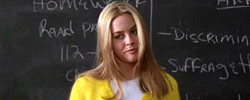Reviews
Peyton Reed
USA, 2000
Credits
Review by Rumsey Taylor
Posted on 24 July 2006
Source Universal DVD
Categories Chick Flicks
During a football match, Torrance, the cheerleader squad captain, makes eyes at a boy in the stadium. Two of her girls scoff: “You’re having cheersex with him.” Much like Funkadelic’s funk or OutKast’s stank, a colloquial prefix is established, instilling a unique vernacular in a universe otherwise derivative of our own.
This example is particularly revealing, as it analogizes cheering with sex, even though the action is devoid of any physical contact. By this measure, the temptress may be considered a whore by her peers, her unintimate gesture implicated for some obscenity. This is exemplified in what I consider to be the film’s best scene: Torrance is spending the night with Missy, a fellow cheerleader whose brother, Cliff, she has a crush on. She is brushing her teeth; Cliff enters and proceeds to brush his. During the minute that this lasts, no dialogue is exchanged, only hesitant glances between rounds of spitting toothpaste into the running sink between them. Cliff finishes first, smiles big, and exits. This scene is absolutely restrained, and yet so steeped in sexual tension that it may be considered profoundly erotic.
The language and subversion demonstrated herein is crucial to Bring it On, because otherwise it is populated with the familiar amenities of the disreputable genre of teenage film: characters initiated from distinct stereotypes; melodrama contrived from the presumably collective incentive to be accepted by one’s peers; and competition within a social hierarchy. It attempts to forward the concept of high school as microcosm—and if we are to learn from this demonstration, then honesty and humbleness will assuage any conflict. The enterprise is totally familiar, but to deem these clichés a fault is tantamount to dismissing a horror film because it’s too scary.
Torrance’s squad — the Toros — is the reigning national champion of an annual cheerleading competition. In her first weeks as the squad captain, she discovers that this year’s routine has been lifted verbatim from a rival squad in Compton—the Clovers. Upon her revelatory witnessing of the Clovers’ performance of the very routine her team is intent to perfect, Torrance has the realization that she must devise another routine for her squad, thereby jeopardizing their chances at this year’s competition by rejecting everything they’ve rehearsed so far. She does this despite the possibility that the Clovers may not be able to attend the competition: they represent an inner-city school, and haven’t the means to finance the travel to the competition in Miami.
This pitch isn’t immediately desirable to Torrance’s squad, who, in all, seem content with their pirated routine—they’re conditioned to behave and perform like winners, which is to say originality is of little priority to them. Torrance’s option for a new routine relays an integrity beyond her years (this consideration is especially sympathetic to a teenage character in a teen movie), because in suggesting change she risks her squad’s trust; she is enlarging the proximity of failure. The Toros are rendered underdogs, not because one of its senior members has broken her leg, but because they will reject their time-tested formula for championship.
At this point, the film is less concerned with competition than it is with liberation; both, however, will be told in the burst of estrogen that is the film’s excited final act. The conclusion may be fairly obvious, but it’s largely irrelevant in comparison to how uniquely Bring it On characterizes its teens, predominantly comprised of women. They are a string of paper dolls, ultimately striving for liberation from their chain.
More Chick Flicks
-

The Truth About Cats & Dogs
1996 -

Say Anything
1989 -

Gas Food Lodging
1992 -

Pretty Woman
1990 -

Walking and Talking
1996 -

Mean Girls
2004 -

Fried Green Tomatoes
1991 -

Private Benjamin
1980 -

Clueless
1995 -

Erin Brockovich
2000 -

The Bridges of Madison County
1995 -

Bridget Jones’s Diary
2001 -

Working Girl
1988 -

Bend It Like Beckham
2002 -

Bring It On
2000 -

Ghost
1990 -

Truly Madly Deeply
1991 -

The Last of the Mohicans
1992
We don’t do comments anymore, but you may contact us here or find us on Twitter or Facebook.



